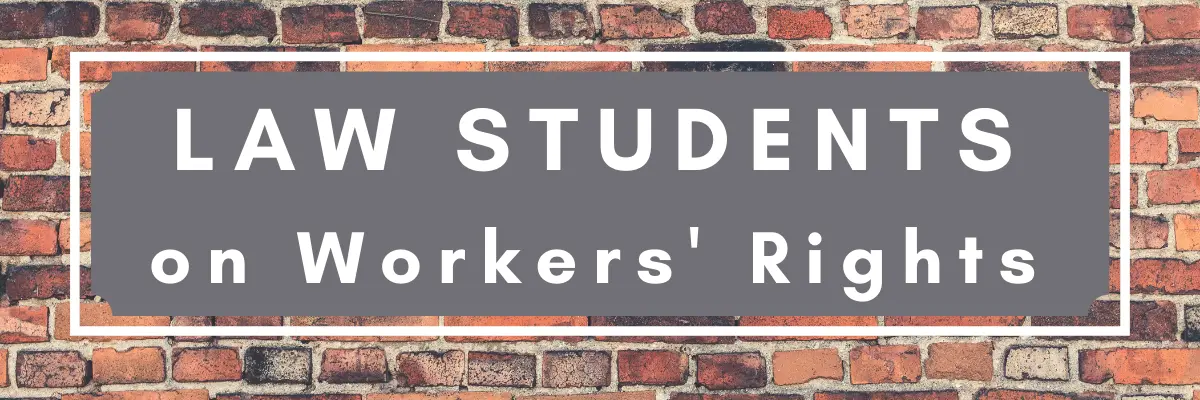
Attacks on Unions are the Biggest Threat to Workers’ Rights
June 28, 2022
By Caiti Hall
The Law Students on Workers’ Rights series publishes essays from current and incoming students at some of the top law schools in the country. These essays, submitted for the Charles E. Joseph Employment Law Scholarship, address the question “What are the biggest challenges facing workers’ rights in the future?”
When working people organize and fight together, they win. Unions allow working people to collectively use their power to win higher pay, better working conditions, and more democratic workplaces. Unfortunately, for working people, the share of workers represented by unions has dropped from 27% in 1979 to a record low of 10.3% in 2021. This decline is not due to a lack of interest in forming unions—polls indicate the desire to be covered by a union contract is higher than it was in the ‘70s—but rather from sustained attacks on workers’ ability to form a union. Attacks on unions are the biggest challenge facing workers today.
Corporations target union membership because unions are so successful at raising wages and improving the working conditions of all workers. On average, a worker covered by a union contract earns 13.2% more in hourly wages than someone with similar education, occupation, and experience in a non-unionized workplace sector. Unions do not just improve pay and conditions for represented workers. Unions contribute to what sociologists describe as a “moral economy” that “institutionalizes norms for fair pay, even for non-union workers.” The benefits unions provide all workers make unions a potent tool in the fight against rising income and wealth inequality. This is particularly true for Black workers, who since the 1940s have been more likely to participate in unions. The decline in private-sector unions has contributed to the pay gap between Black and white workers.
Attacks on unions come in many forms. While the National Labor Relations Act makes it illegal for employers to intimidate or fire workers for union-organizing, there are no serious economic disincentives built into the law to keep them from doing just that. Employers are charged with illegally firing union activists in nearly 20% of all National Labor Relations Board election campaigns. Recent examples of this practice occurred during efforts to unionize Starbucks stores across the country. Starbucks has decreased the hours of union organizers and, in some cases, fired them outright.
Just as insidious are so-called “right-to-work” laws that undermine union resources by making it illegal for unions to require non-union members of a collective bargaining unit to pay fees that cover the basic costs of representing the employees in the workplace. The Supreme Court decision in Janus v. AFSCME, made this the rule for all public-sector unions. Employers’ anti-union practices, bolstered by weak protections for unionizing workers, and anti-union legislation and court decisions have contributed to a steep decline in union power and a sharp increase in income inequality.
Despite a continued attack on unions, there is reason for hope. Multiple polls show that union approval is high and growing among young workers and that union membership levels for workers ages 25–34 are increasing at a higher rate than other workers. In January of this year, there were 170 petitions filed for union elections, a jump from the 83 filed in January of 2021. And the success of the recent union drive at the Staten Island Amazon warehouse, in spite of the millions Amazon has spent on anti-union campaigns, has energized the labor movement.
To keep this momentum, Congress must act to support these workers who are bravely organizing their workplaces in the face of brutal anti-union campaigns. The Protect the Right to Organize (PRO) Act would address some of the ways employers weaken the power of unions. Specifically, the Act would introduce meaningful, enforceable penalties for employers that violate workers’ rights, expand workers’ collective bargaining rights, strengthen workers’ access to fair union elections, and require employers to respect election results. Without these protections, workers will continue to be discouraged from organizing, and those that do may face unfair retaliation.
As a union member, who, with my coworkers, helped unionize my workplace, I know firsthand the importance of unions to improve working conditions. My union of professional staff at the Washington State Attorney General’s Office formed during the beginning of the COVID-19 pandemic when state budget projections were dire. Forming a union limited furloughing, protected our healthcare benefits from being slashed, and allowed us to bargain for a more flexible telework policy and a safe return-to-work plan. This year, because we had a union, we were able to reopen our contract negotiations to win the highest wage increase for Washington state workers in years. Unions are essential to building worker power. Every worker should be able to join a union. I am going to law school to continue to fight alongside workers as an attorney.
Reflections from Charles Joseph
When workers unionize, they expand their rights. Union organizers in the 20th century gained victories like a national minimum wage and guaranteed overtime pay. But as Caiti Hall identifies, strong forces oppose unions today.
Drawing on her experience as a union member, Hall identifies the benefits of unionizing and the opposition workers face. While the fight will continue in the future, unions play a central role in protecting workers.
Caiti Hall holds a bachelor’s degree in global development studies and politics from the University of Virginia. She works in the civil rights division of the Washington State Attorney General’s Office and will join the Berkeley Law class of 2025 in the fall. Hall is the runner up for the Charles E. Joseph Employment Law Scholarship for the 2022/2023 academic year.
Charles Joseph has over two decades of experience as an NYC employment lawyer. He is the founder of Working Now and Then and the founding partner of Joseph and Kirschenbaum, a firm that has recovered over $140 million for clients.